11 of the best machine learning courses
The best machine learning courses for helping to kickstart your career in an industry at the cutting-edge of technological innovation


- 1. Supervised Machine Learning: Regression and Classification
- 2. Machine Learning Foundations: A Case Study Approach
- 3. Machine Learning for All
- 4. Machine Learning with Python
- 5. Introduction to Machine Learning with TensorFlow
- 6. Machine Learning Crash Course with TensorFlow APIs
- 7. Machine Learning A-Z: AI, Python & R + ChatGPT Bonus
- 8. Introduction to Machine Learning in Production
- 9. Python for Data Science and Machine Learning Bootcamp
- 10. Machine Learning for Musicians and Artists
- 11. Practical Deep Learning for Coders
The demand for machine learning expertise continues to surge across industries, driven by an explosion in data generation and the increasing computational power available to process it. Selecting from the best machine learning courses is therefore a pivotal step for professionals looking to elevate their careers or master new, critical skills in this dynamic and rapidly evolving field.
As organizations increasingly embed artificial intelligence and machine learning into their core operations — from optimizing supply chains and personalizing customer experiences to powering innovative research and development — proficiency in developing, deploying, and managing these sophisticated models is no longer a niche skill but a fundamental business imperative.
This necessity is clearly reflected in the significant earning potential for skilled individuals; for instance, ML engineers in 2024 can expect average salaries in the region of $166,574, a figure indicative of the high value placed on this specialized knowledge. Beyond financial incentives, mastering machine learning opens doors to advanced career pathways, offering opportunities to tackle complex challenges and drive innovation.
To help you navigate the diverse educational landscape and identify programs that align with your specific aspirations and current skill set, we present a curated selection of leading courses. These are tailored for various experience levels, from foundational introductions for newcomers to advanced specializations for seasoned IT professionals, all designed to equip you with the practical skills and theoretical understanding needed to thrive.
This selection of machine learning courses has been compiled based on a range of factors. These include positive learner feedback, the accessibility and structure of the course content, and the suitability of each program for various experience levels, from individuals new to machine learning to established IT professionals looking to upskill or specialize. Our aim is to provide a diverse overview of the current educational offerings, assisting you in identifying programs that align with your learning objectives and career development in this field. There are numerous machine learning courses available online. Here are 11 of our favorites.
The 11 best machine learning courses
1. Supervised Machine Learning: Regression and Classification
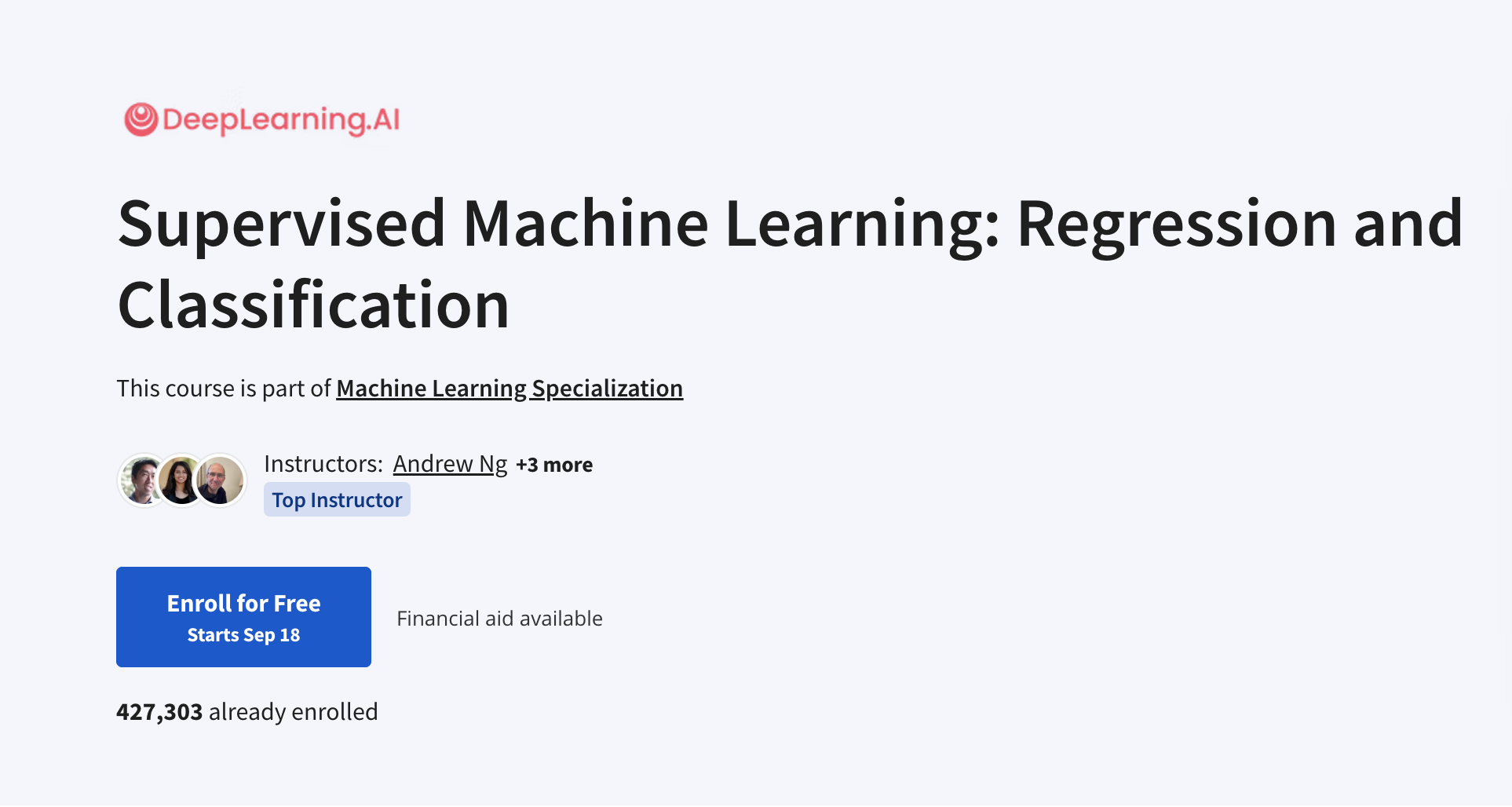
Provider: DeepLearning.AI (via Coursera)
Price: Typically included with a Coursera Plus subscription (around $59/month) or through individual specialization purchase (pricing can vary by region and time).
Course link: Supervised Machine Learning: Regression and Classification
Course length: 33 hours
This foundational course, led by Andrew Ng, offers a comprehensive introduction to core machine learning concepts, data mining, and statistical pattern recognition. Key topics include supervised learning (covering regression and classification techniques), an overview of unsupervised learning, best practices in developing machine learning models, and illustrative case studies and applications.
The course serves as a cornerstone of DeepLearning.AI's highly regarded Machine Learning Specialization. Learners can often move on to more advanced modules within this specialization, although access may require ongoing subscription or separate enrollment for subsequent courses.
Andrew Ng remains a leading and influential figure in the machine learning field. This Coursera offering consistently receives positive reviews, praised for its clear structure, Ng's effective teaching style, and practical examples that demystify fundamental ML principles.
Why it remains a top choice: Andrew Ng is a globally recognized leader in AI and machine learning. This course's enduring popularity is reflected in its consistently high ratings (often 4.9 out of 5 stars based on hundreds of thousands of reviews) and its enrollment numbers, which are well into the millions. Learners consistently praise its clear structure, Ng's exceptional teaching style that simplifies complex topics, and the practical examples that effectively demystify fundamental ML principles, making it a benchmark foundational course.
2. Machine Learning Foundations: A Case Study Approach
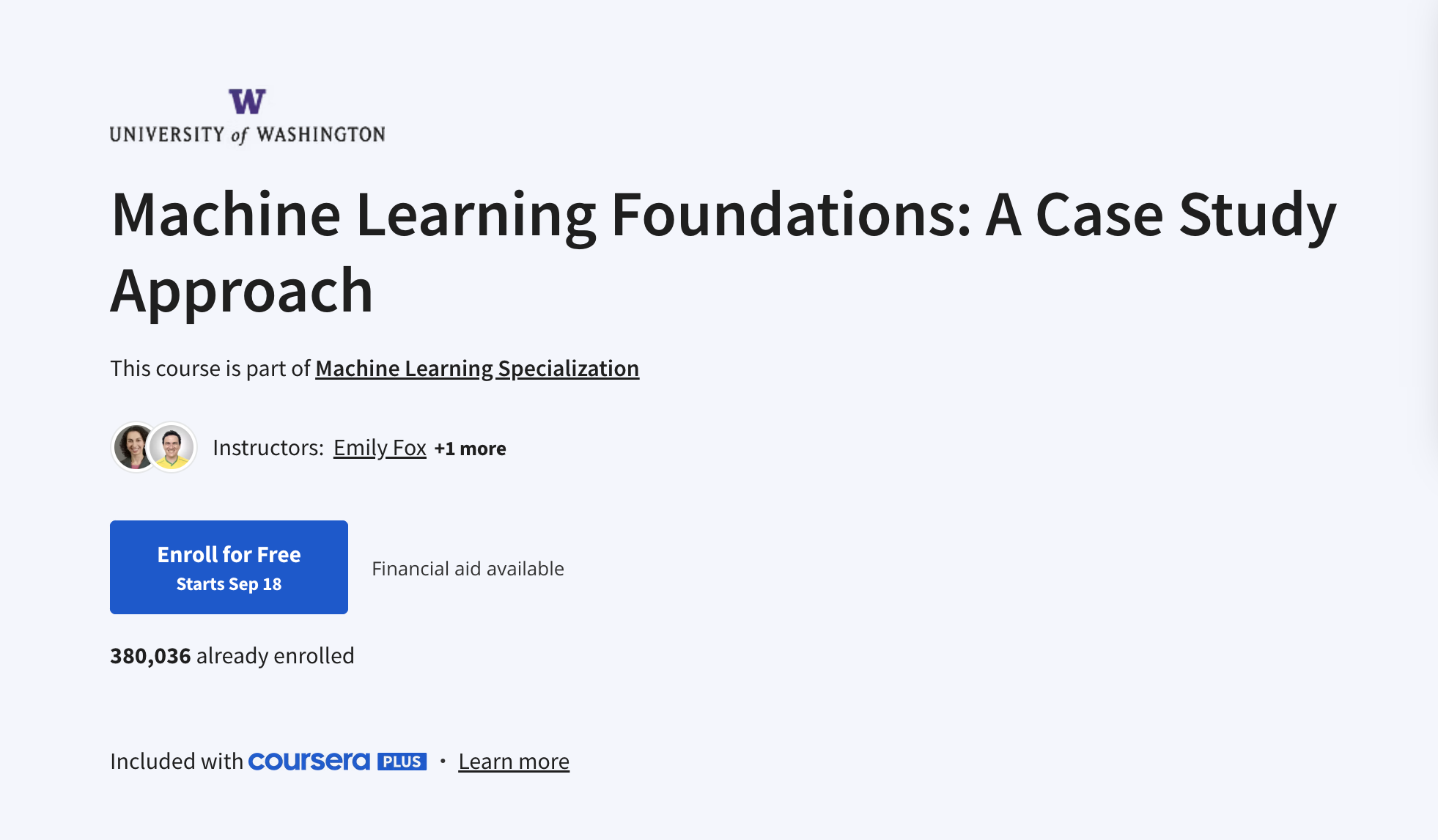
Provider: University of Washington (via Coursera)
Price: Typically included with a Coursera Plus subscription (around $59/month) or through individual specialization purchase (pricing can vary by region and time).
Course link: Machine Learning Foundations: A Case Study Approach
Course length: Approximately 18-20 hours
With this comprehensive introduction to machine learning, you’ll gain hands-on experience through practical case studies, learning to predict house prices, analyze sentiment from reviews, retrieve documents, recommend products, and search for images.
The course focuses on understanding tasks, matching them to machine learning tools, and assessing output quality. You’ll learn to identify applications of machine learning, apply various techniques, represent data as features, assess model quality, and build applications with machine learning at their core.
The course is also part of a larger specialization offered by the University of Washington, allowing learners to potentially purchase additional individual courses or access them via subscription to develop their skills further.
This highly rated Coursera course is consistently praised for its practical approach using real-world case studies. Reviewers often find that the hands-on format significantly improves their understanding and application of ML skills.
Why it remains a top choice: This University of Washington course maintains high ratings on Coursera, frequently praised for its practical, case-study-driven methodology. Learners often report that this hands-on approach significantly enhances their understanding and ability to apply ML concepts in real-world scenarios. Its structure, focusing on matching ML tools to specific tasks and evaluating outcomes, provides a solid, intuitive foundation for beginners.
3. Machine Learning for All
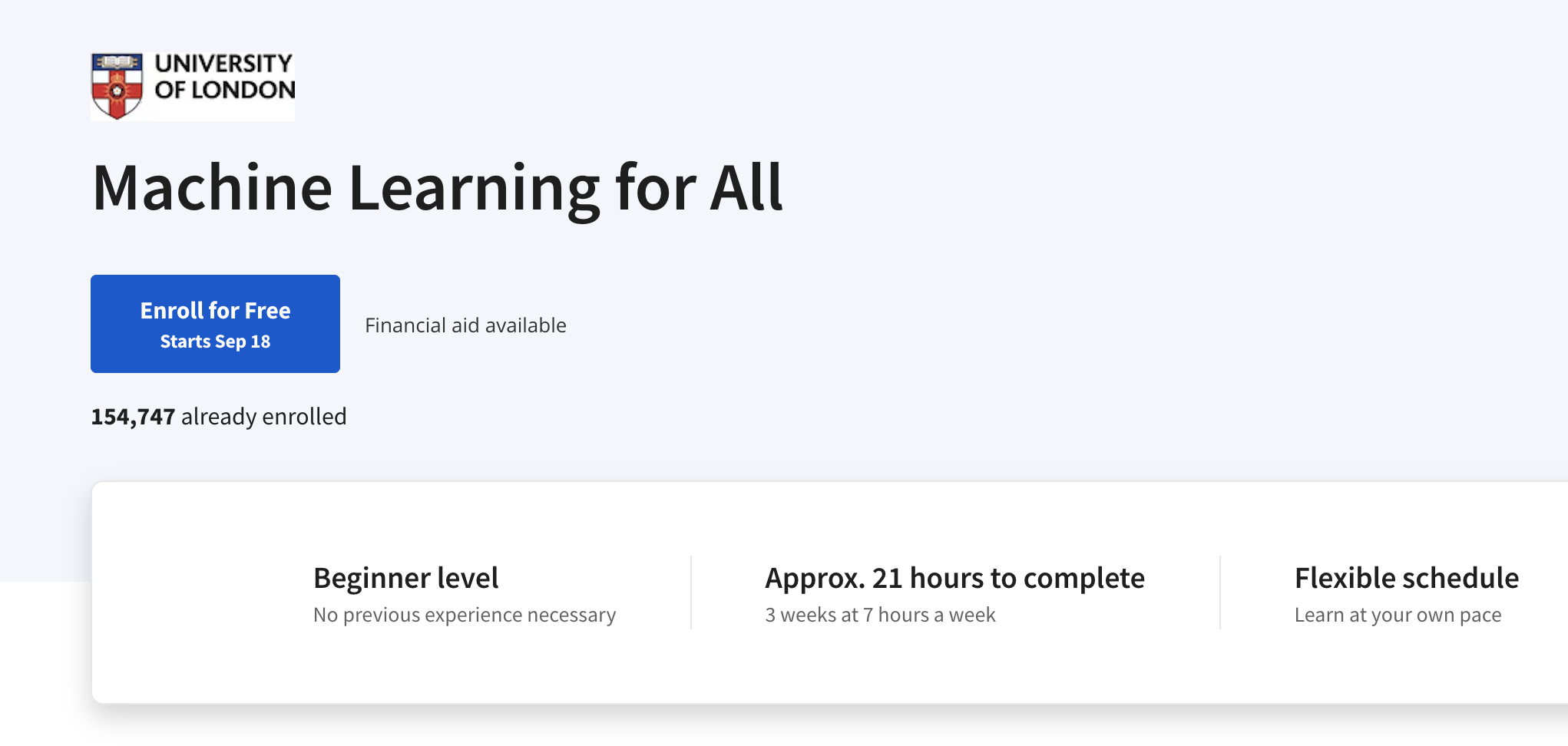
Provider: University of London (via Coursera)
Price: Typically included with a Coursera Plus subscription (around $59/month or can be audited for free. A fee applies for the shareable certificate if not using Coursera Plus).
Course link: Machine Learning for All
Course length: 21 hours
This machine learning course, created by the University of London and led by Professor Marco Gillies from Goldsmiths, University of London, is designed to introduce fundamental machine learning concepts to individuals with little or no prior programming experience. It offers a practical, hands-on approach to learning, making complex ideas accessible.
A key feature of the course is a practical project, such as training a computer to recognize images, using intuitive tools developed at Goldsmiths, University of London. The curriculum explores how machine learning technologies function, the impact of data representation (features) on outcomes, and methods for training and testing models. Additionally, the course encourages learners to critically assess the societal benefits and challenges associated with machine learning.
Highly regarded for its ability to simplify intricate topics, this introductory course has received positive feedback for its effectiveness in engaging beginners, particularly those without a technical background or programming experience.
Why it remains a top choice: This course consistently earns positive feedback for its unique ability to demystify machine learning for absolute beginners, particularly those without a technical or programming background. Its strength lies in the accessible teaching style of Professor Marco Gillies and the practical, hands-on project using intuitive tools from Goldsmiths. By focusing on conceptual understanding and societal implications alongside basic mechanics, it fills a crucial niche for a broader audience looking to grasp what ML is and how it functions, making it an enduringly valuable introductory resource.
4. Machine Learning with Python
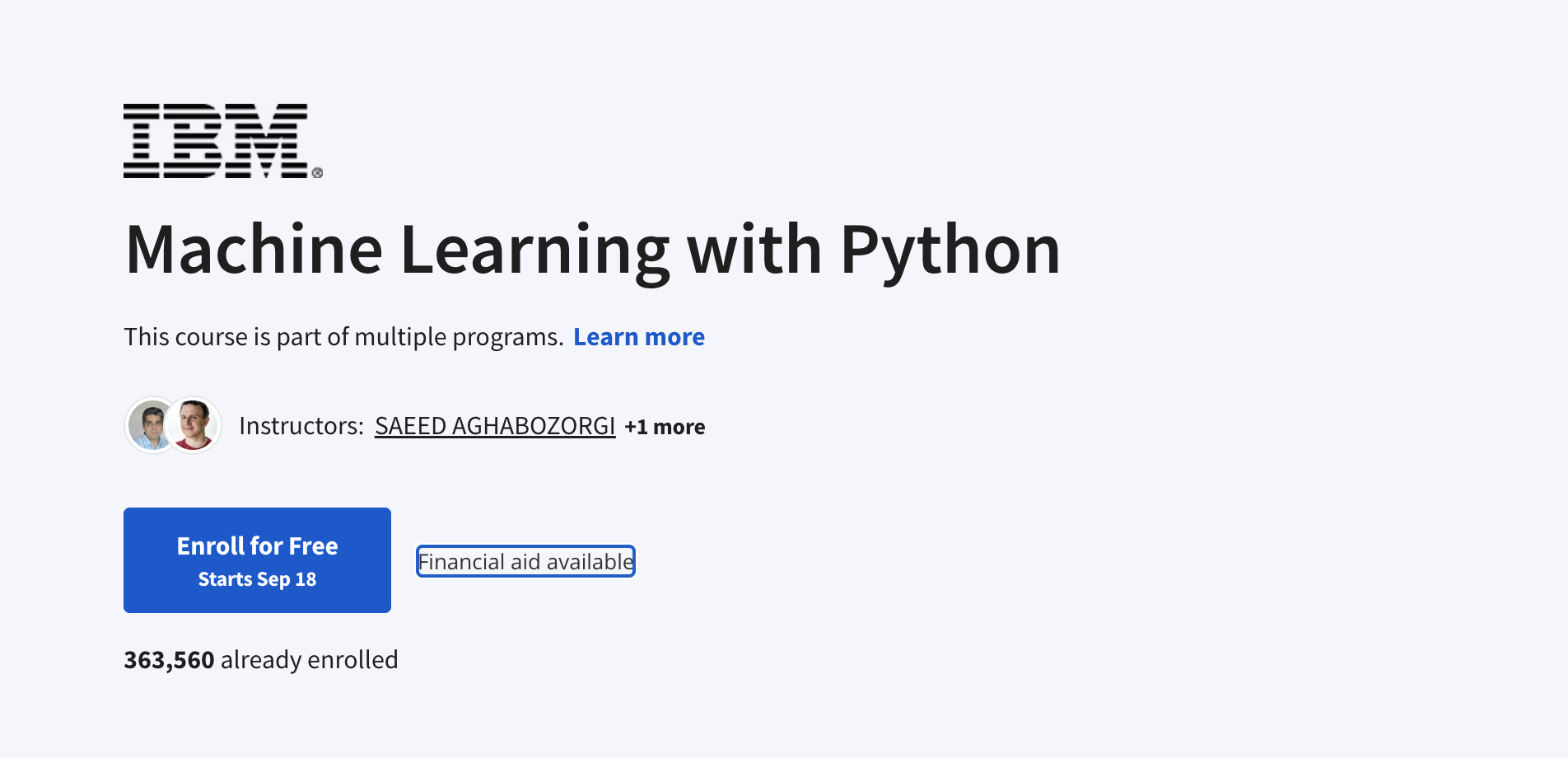
Provider: IBM (via Coursera)
Price: Typically included with a Coursera Plus subscription (around $59/month or can be audited for free. A fee applies for the shareable certificate if not using Coursera Plus).
Course link: Machine Learning with Python
Course length: 12 hours
This module offers a comprehensive introduction to Machine Learning using Python, perfect for aspiring data scientists and newcomers to AI and deep learning. It covers core concepts like supervised and unsupervised learning, regression, and classification, emphasizing hands-on experience with tools like SciPy and scikit-learn.
Learners will apply their knowledge through interactive labs and a final project, reinforcing skills in model training, data preprocessing, and evaluation. The course also explores ethical considerations and real-world implications of machine learning, equipping participants with both technical expertise and a broader understanding of AI’s impact.
By the end of the course, you'll gain job-ready skills and earn a certificate in machine learning.
IBM’s machine learning course is part of Coursera’s broader specializations in AI engineering and Data Science Professional, both of which offer certificates upon completion for an additional cost. The course is highly regarded for its focus on the practical application of machine learning using Python, featuring hands-on labs and projects to equip learners with essential skills. Its flexibility makes it an excellent choice for those exploring various career paths or further specialisation in the field.
Why it remains a top choice: Backed by IBM, a major player in enterprise AI and data science, this course offers significant credibility and industry relevance. Its enduring appeal lies in its strong focus on the practical application of machine learning using Python, a dominant language in the field. The inclusion of hands-on labs and projects is consistently praised by learners for building essential, job-ready skills. Furthermore, its integration into IBM's popular Professional Certificates on Coursera (like Data Science and AI Engineering) ensures it remains a well-maintained and sought-after component for those pursuing comprehensive, recognized credentials.
RELATED WHITEPAPER

5. Introduction to Machine Learning with TensorFlow
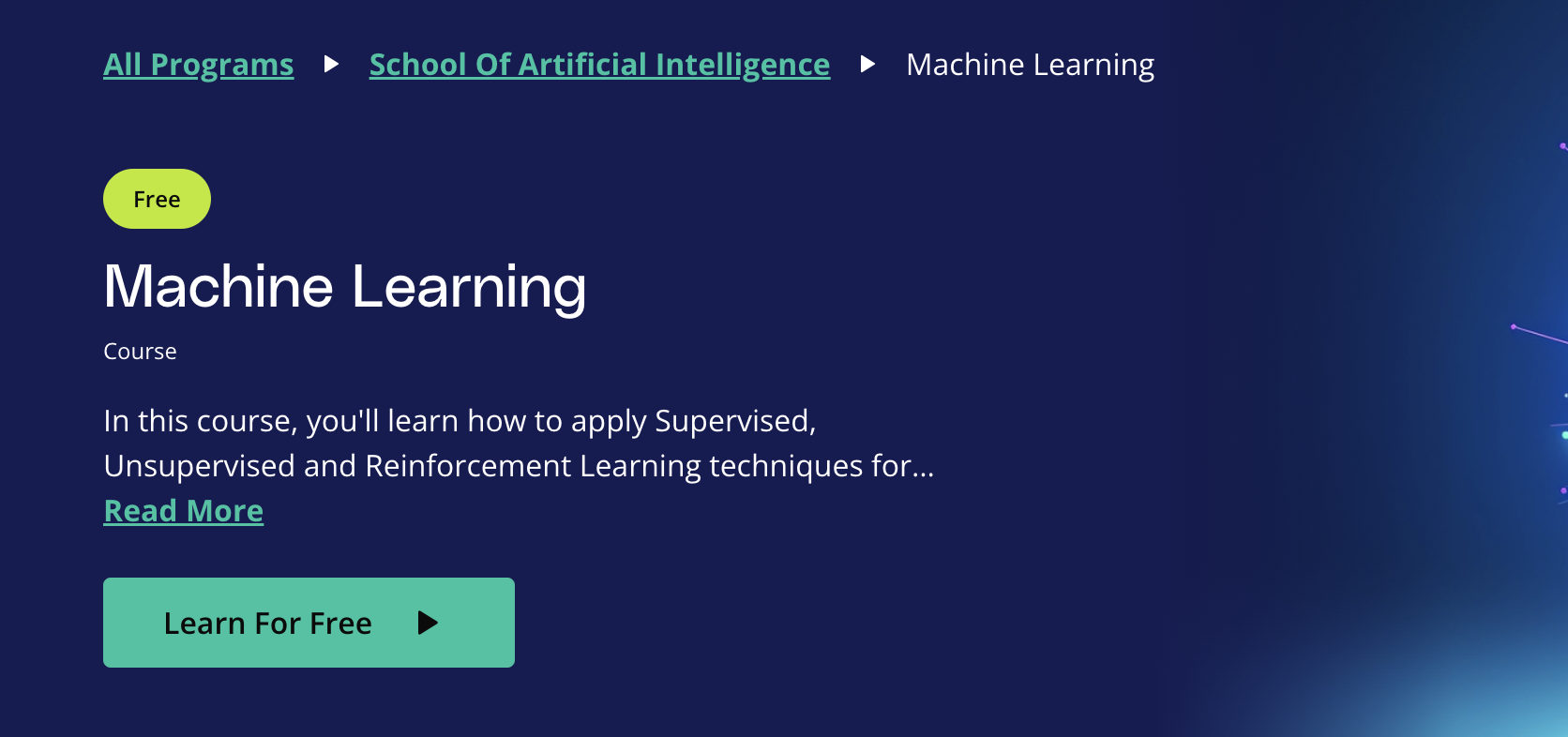
Provider: Udacity
Price: Monthly subscription is £94. Individual courses cost £377.50 as a one-time payment.
Course link: Machine Learning
Course length: 49 hours
This course, originating from the renowned computer science program at Georgia Tech, offers an in-depth exploration of machine learning concepts and algorithms. It's generally suited for learners with some programming experience and a foundation in mathematics (e.g., probability, linear algebra).
The curriculum typically covers a broad range of machine learning techniques, including supervised learning (e.g., decision trees, support vector machines, neural networks), unsupervised learning (e.g., clustering, dimensionality reduction), and reinforcement learning concepts. Emphasis is often placed on understanding the theoretical underpinnings of these algorithms, as well as their practical application to solve complex problems. Students may engage with challenging projects and rigorous assignments reflective of Georgia Tech's academic standards..
Why it remains a top choice: The association with Georgia Tech, a leading institution in computer science and AI research, lends significant credibility and academic rigor to this offering. Learners often choose this path for a deeper, more theoretically grounded understanding of machine learning that goes beyond introductory material. The challenging curriculum and project work are designed to build robust, transferable skills, making it a strong option for those seeking a comprehensive education in the field, often valued by employers seeking advanced ML competency.
6. Machine Learning Crash Course with TensorFlow APIs
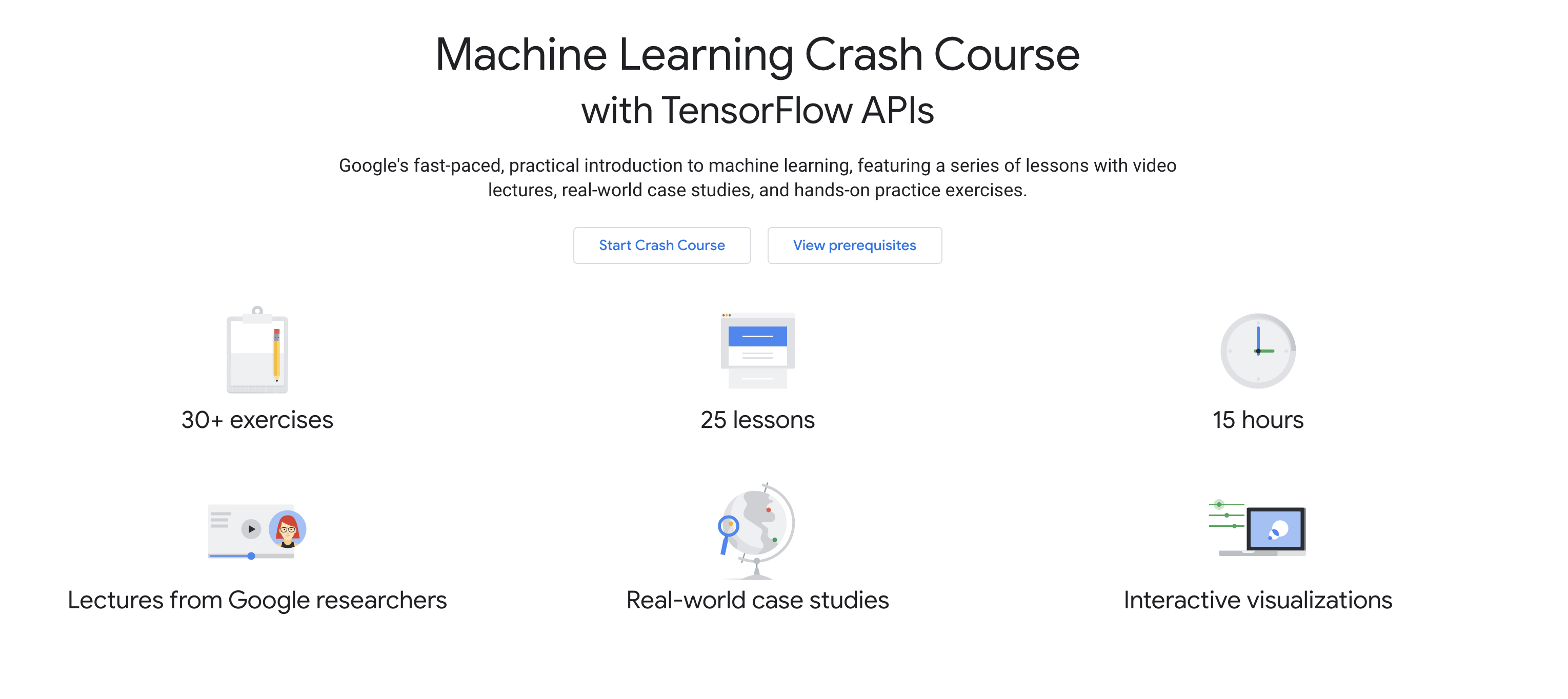
Provider: Google
Price: Free
Course link: Machine Learning Crash Course with TensorFlow APIs
Course length: 15 hours
This course, offered directly by Google, provides a fast-paced, practical introduction to machine learning fundamentals and concepts. It features a combination of video lectures from Google researchers, real-world case studies, and over 25 hands-on practice exercises using TensorFlow APIs.
The curriculum is structured into numerous lessons and exercises, covering key machine learning concepts such as framing ML problems, data preparation, feature engineering, descending into ML (training models), generalization, and an introduction to neural networks. It also touches upon ML engineering best practices and responsible AI development.
Why it remains a top choice: This course offers unparalleled insight directly from Google, a global leader in AI and machine learning. Its enduring value lies in its practical, concise approach to complex topics, making ML accessible to a broad audience, including those new to the field. The hands-on exercises with TensorFlow, interactive visualizations, and clear explanations from Google researchers are consistently praised. Being free and self-paced, it serves as an excellent, high-quality entry point or refresher for anyone looking to quickly grasp core ML principles and their application.
7. Machine Learning A-Z: AI, Python & R + ChatGPT Bonus
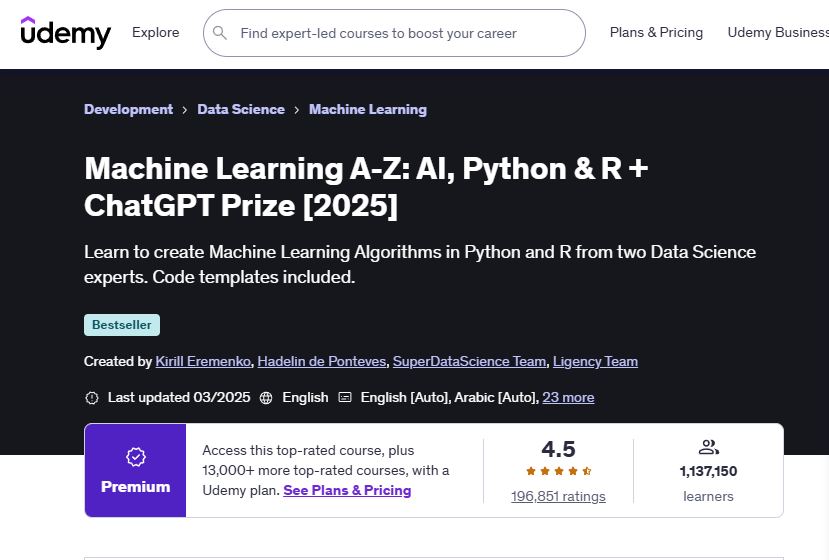
Provider: Kirill Eremenko et al (via Udemy)
Price: £89.99
Course link: Machine Learning A-Z: AI, Python & R + ChatGPT Bonus
Course length: 42.5 hours
This extensive course aims to provide a comprehensive understanding of a wide array of Machine Learning models and techniques, designed to equip students with the skills to make accurate predictions, perform insightful analyses, and build robust models using both Python and R.
It covers a broad spectrum of topics, including supervised and unsupervised learning, reinforcement learning, natural language processing, deep learning, and dimensionality reduction. A key feature is the hands-on coding intuition provided for many algorithms. The inclusion of content like a "ChatGPT Bonus" indicates efforts to keep the material current with emerging AI trends. Learners work towards selecting appropriate ML models for different problems and applying their knowledge effectively.
Why it remains a top choice: This course has consistently been a bestseller on Udemy, with hundreds of thousands of students enrolled and a large volume of positive reviews. Its enduring popularity stems from its breadth, covering a vast number of ML algorithms and providing practical code templates in both Python and R, which is a unique offering. The instructors are well-regarded, and the course's "A-Z" approach appeals to learners looking for a one-stop-shop to get acquainted with a wide range of ML concepts and their implementation. Regular updates, like the inclusion of ChatGPT-related content, also help maintain its relevance.
8. Introduction to Machine Learning in Production
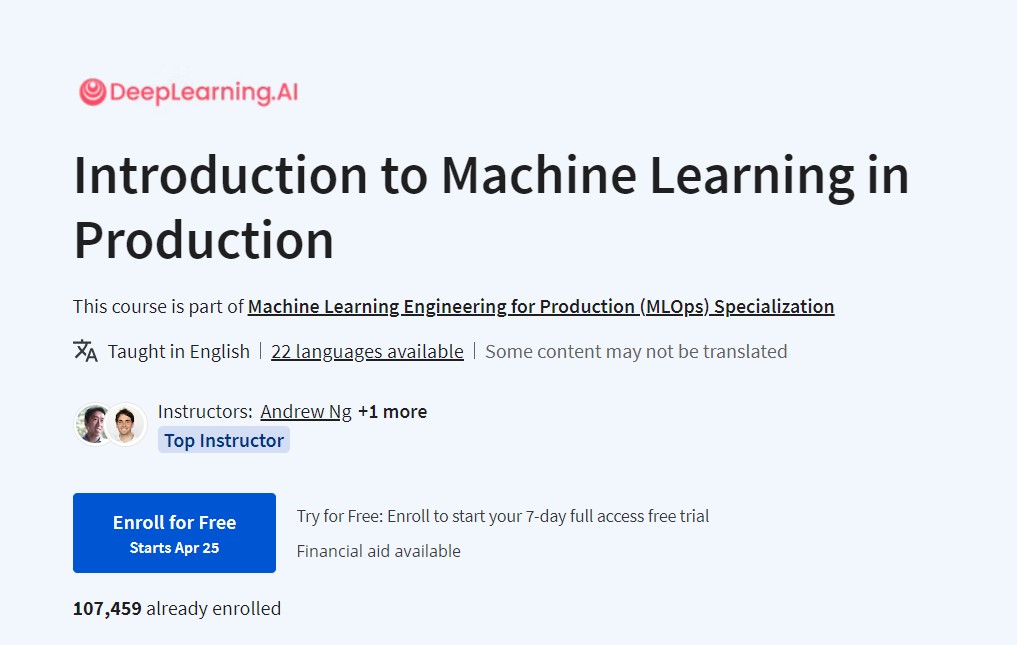
Provider: DeepLearning.AI (via Coursera)
Price: Typically included with a Coursera Plus subscription (around $59/month or regional equivalent). Access may also be available via specialization purchase or individual course enrollment; free audit options may be available for the course content without a certificate.
Course link: Introduction to Machine Learning in Production
Course length: 11 hours
This course, developed by DeepLearning.AI and featuring instruction from Andrew Ng, focuses on the practical aspects of deploying and managing machine learning models in real-world production environments. It addresses the often-overlooked lifecycle of an ML project beyond just model training.
Key topics covered include understanding the full ML lifecycle and pipeline, data iteration, concept drift, model monitoring, human-level performance (HLP) analysis, effective project scoping and design, and the challenges associated with deploying ML systems. The course aims to equip learners with the knowledge to identify and solve common problems encountered when working with structured and unstructured data, for both small and large datasets in a production context.
Why it remains a top choice: This course addresses a critical and often underserved area of machine learning: MLOps, or the operationalization of models. Its focus on the entire lifecycle—from project scoping and data management in production to model monitoring and addressing concept drift—is highly valuable for professionals aiming to build and maintain robust, real-world ML systems. Being part of DeepLearning.AI's MLOps Specialization and led by Andrew Ng, it carries significant authority and provides insights essential for anyone moving beyond theoretical model building to practical deployment at scale. Learner feedback consistently highlights its practical relevance to "ML in the wild."
9. Python for Data Science and Machine Learning Bootcamp
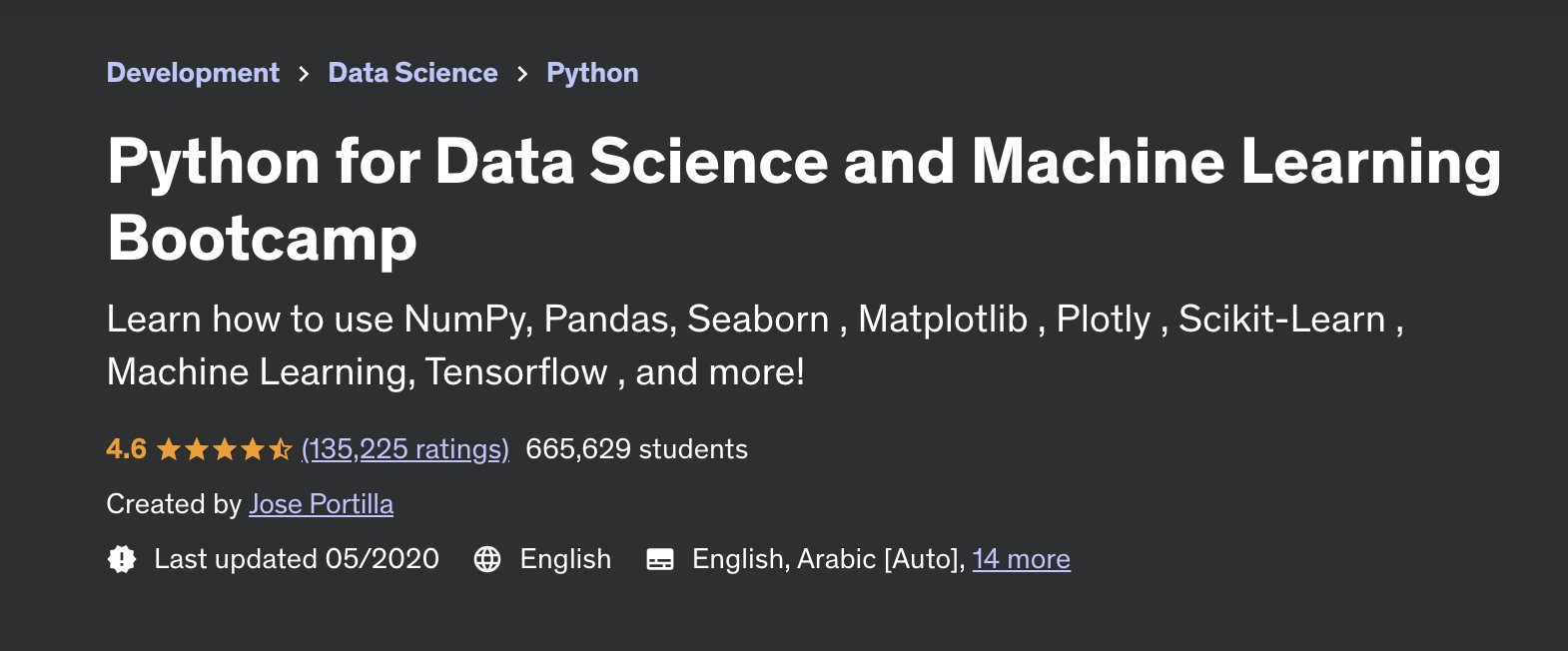
Provider: Jose Portilla (via Udemy)
Price: Udemy course prices vary significantly due to frequent sales and regional pricing. While a list price might be around $99.99-$129.99, it's common to find this course available for a much lower promotional price (e.g., $15−25). Always check the official course page for the most current pricing.
Course link: Python for Data Science and Machine Learning Bootcamp
Course length: 25 hours
This comprehensive bootcamp, led by renowned Udemy instructor Jose Portilla, is designed to equip learners with the skills to use Python for data science and machine learning. It's a popular choice for those looking to build a strong foundation in the entire data science workflow, from programming fundamentals to deploying machine learning models.
The curriculum covers a wide array of essential topics, including core Python programming, data analysis and manipulation with libraries like Pandas and NumPy, data visualization techniques using Matplotlib and Seaborn, and an extensive exploration of machine learning algorithms with Scikit-Learn. Learners will work with various models, including linear regression, logistic regression, K-Nearest Neighbors, decision trees, random forests, support vector machines, K-means clustering, Principal Component Analysis (PCA), and an introduction to Natural Language Processing (NLP), Recommender Systems, and an overview of Big Data concepts like Spark.
Why it remains a top choice: This bootcamp consistently ranks as a bestseller on Udemy, boasting well over a million student enrollments and tens of thousands of positive reviews, often with an average rating of 4.6 stars or higher. Its enduring popularity is due to Jose Portilla's clear and engaging teaching style, the comprehensive curriculum that covers the full data science pipeline with Python, and the extensive hands-on projects that build practical skills. It's widely regarded as one of the most value-packed and effective courses for individuals aiming to master Python for data science and machine learning applications from the ground up.
10. Machine Learning for Musicians and Artists
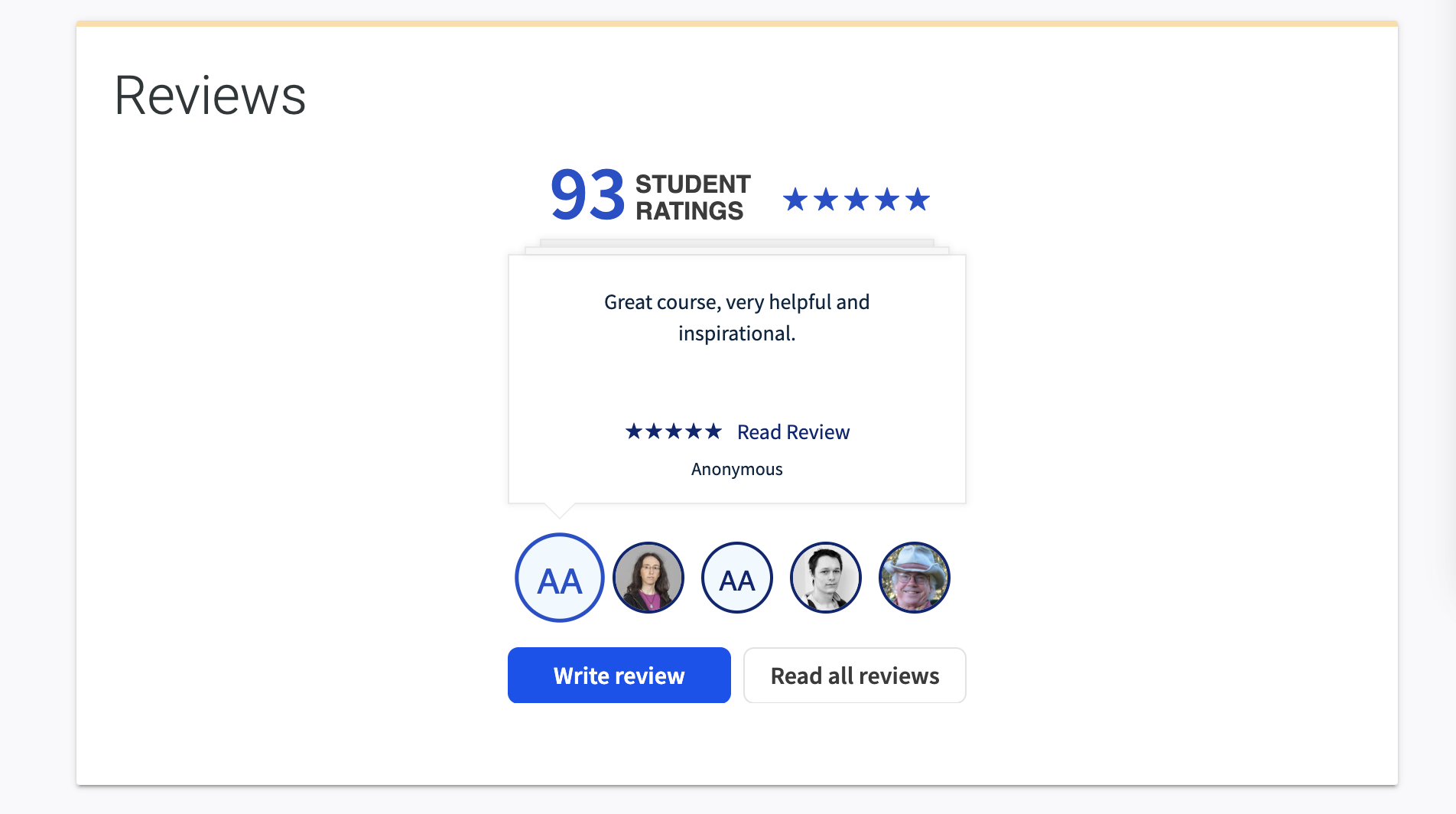
Provider: Goldsmiths, University of London (via Kadenze)
Price: $20 per month
Course link: Machine Learning for Musicians and Artists
Course length: 56 hours
This course teaches fundamental machine learning techniques specifically tailored for application in creative arts, focusing on making sense of human gestures, musical audio, and other real-time data relevant to artistic expression. It is particularly known for its use of the Wekinator software, developed by Dr. Rebecca Fiebrink, often associated with this course and Goldsmiths.
The curriculum emphasizes learning about algorithms, software tools, and best practices that can be immediately employed in creating new, real-time, interactive systems in the arts. Topics covered include classification, regression, segmentation, and the "machine learning pipeline." The course also introduces practical feature extraction techniques for music, dance, gaming, and visual art, aiming to make machine learning accessible to creative practitioners without requiring an extensive background in computer science.
Why it remains a top choice: This course fills a distinct and important niche by making complex machine learning concepts accessible and directly applicable to the creative arts. Its continued relevance stems from the expertise of Goldsmiths, University of London, a renowned institution in arts and technology, and the practical, hands-on approach using tools like Wekinator. It empowers artists, musicians, and designers to integrate ML into their practice in innovative ways, a domain not commonly addressed by more general ML courses. Positive feedback often highlights its unique pedagogical style tailored for creative individuals.
11. Practical Deep Learning for Coders
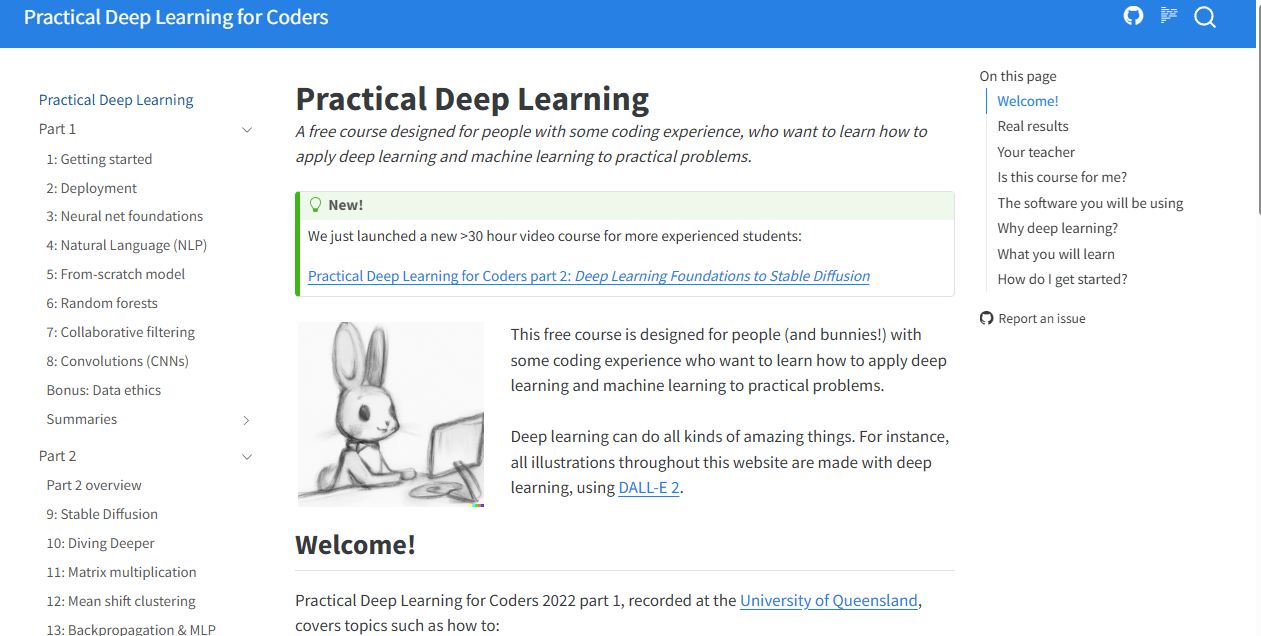
Provider: Fast.ai
Price: Free
Course link: https://course.fast.ai/
Course length: Substantial; comprises multiple lessons with extensive video lectures and notebooks (e.g., Part 1 typically around 7 lessons, each several hours). Self-paced.
This highly acclaimed course, developed by Jeremy Howard and Sylvain Gugger, takes a "top-down" practical approach to teaching deep learning. It’s designed for individuals who can already code and aims to get them training state-of-the-art models quickly, then delving into the underlying theory.
The curriculum uses the fastai library (built on PyTorch) and covers a wide range of deep learning applications, including computer vision, natural language processing, tabular data analysis, and recommendation systems. Students learn by working through Jupyter Notebooks, building and experimenting with models from the outset. The course emphasizes practical techniques and best practices used by leading practitioners.
Why it's a top choice: Fast.ai's "Practical Deep Learning for Coders" has a stellar reputation for its effectiveness in teaching cutting-edge deep learning in an accessible, code-first manner. It's renowned for demystifying complex topics and enabling students to achieve impressive results rapidly. The course is consistently updated to reflect the latest advancements in the field, and its strong community, free availability, and the expertise of its instructors make it an invaluable resource for anyone serious about applying deep learning. Its pragmatic philosophy contrasts with more theory-heavy courses, making it uniquely effective for many learners.
Sign up today and you will receive a free copy of our Future Focus 2025 report - the leading guidance on AI, cybersecurity and other IT challenges as per 700+ senior executives
Rene Millman is a freelance writer and broadcaster who covers cybersecurity, AI, IoT, and the cloud. He also works as a contributing analyst at GigaOm and has previously worked as an analyst for Gartner covering the infrastructure market. He has made numerous television appearances to give his views and expertise on technology trends and companies that affect and shape our lives. You can follow Rene Millman on Twitter.
-
 Microsoft unveils Maia 200 accelerator, claiming better performance per dollar than Amazon and Google
Microsoft unveils Maia 200 accelerator, claiming better performance per dollar than Amazon and GoogleNews The launch of Microsoft’s second-generation silicon solidifies its mission to scale AI workloads and directly control more of its infrastructure
-
 Infosys expands Swiss footprint with new Zurich office
Infosys expands Swiss footprint with new Zurich officeNews The firm has relocated its Swiss headquarters to support partners delivering AI-led digital transformation
-
 How to become a more collaborative leader in the post-COVID workplace
How to become a more collaborative leader in the post-COVID workplaceFeature Business management has evolved into collaborative leadership, but when an organization is working remotely how can business leaders put this into practice?
-
 What role can leadership training play in improving the workplace?
What role can leadership training play in improving the workplace?In-depth Leadership must be dynamic to fulfill its critical function within any organization seeking to deliver high-quality outcomes
-
 How to manage – and mitigate – performative working
How to manage – and mitigate – performative workingFeature An increasing number of people are putting on a show of working, rather than actually getting on with it
-
 What can you do with a business management degree?
What can you do with a business management degree?In-depth A look at what a business management degree involves and the various career opportunities that may become available once completed
-
 Tips for CISOs: Why a focus on 'Goldilocks' candidates may undermine your cyber security strategy
Tips for CISOs: Why a focus on 'Goldilocks' candidates may undermine your cyber security strategyIn-depth CISOs give their take on cyber security recruitment, and why talent diversity should be at the core of every strategy
-
 What is causing the tech industry's significant global decline in VC investment?
What is causing the tech industry's significant global decline in VC investment?In-depth With a backdrop of uncertain economic stability, are the recent significant drops in VC a symptom of the changing tech landscape or simply a re-setting of investment portfolios?
-
 How to make asynchronous collaboration work for your business
How to make asynchronous collaboration work for your businessIn-depth Asynchronous collaboration is loved by some, loathed by others. But if your business does support it, how do you make asynchronous collaboration work?
-
 Strategies for effective upward management while working remotely
Strategies for effective upward management while working remotelyIn-depth Upward management is a basic tenet of good business practice, but how has it been affected by remote working?
